#Strabo
Note
This question usually comes up framed as “did Alexander know about China?” - but what I really want to ask is: how aware was Alexander of what was to the East of his conquests?
He reached India, so he must have known that there were kingdoms / civilizations / countries that form what we presently call India as well. Was he aware of say, Tibet? Or Southeast Asia? I’m fairly certain Alexander and China didn’t know about each other, but if Alexander initially wanted to expand to the east, what did he know about it?
I suspect this changed as he moved east. The wall of the Himalayas is pretty steep. I'm not sure the route that would become the Silk Road was really open yet; it dates to the first century BCE. Alexander did encounter silk, but I believe it was in India. Silk starts popping up in the West after Alexander, although, again, some limited silk coming via Persia (via India) is older.
That said, when the army hit Marakanda/Samarkand, which was ON the later Silk Road, it's entirely possible that he'd have heard something. I doubt it would have been very clear, however.
It's really in India that he'd have heard more. After the Battle of the Hydaspes, the army hung out in Poros's lands for a bit. That's where he heard enough about the extremely warlike nations further into India--as did the army--that led to the indiscipline at the Hyphasis. In fact, some scholars have suggested Alexander actually *staged* the indiscipline, to give him an excuse to turn around. He knew he didn't have enough troops to take on the kingdoms in central India.
How much he heard about China beyond that, I don't know. It would depend on how much was known in the Punjab region.
But certainly, Alexander's army returned with a lot more information about Central Asia, and further east, than had been known before.
Strabo's Geography (Roller has the complete collection translated) is probably the best place to look. He used a number of the now-lost Alexander historians, when writing, and even evaluates the reliability of these.
#Alexander in the East#Alexander in India#Alexander in Baktria#Bactria#Poros#Strabo#Alexander the Great#asks#Classics
25 notes
·
View notes
Text
Okay I know what books I want to write I'm just struggling on where I should start. So poll time...
*Pompeia
In that first option bloody autocorrect hates me
Because like I know I want to start with either Pompeius Magnus for a chronological take or with Pompeia for a backwards order of some sort. Possibly having her compile her family history in her novel and then writing the novels about her predecessors like they're her work. I dunno. Starting a book is always the hardest but my head is so full of ideas.
#roman history#ancient rome#roman empire#how often do you think about the roman empire#ancient history#pompey#pompeius magnus#sextus pompey#Sextus Pompeius#pompeia#pompey Strabo#pompeius#gnaeus pompeius magnus#Pompeius Strabo#strabo#strabo the butcher#julius caesar#the roman empire is my roman empire#rome#Cleopatra#marcus antonius#marcus vipsanius agrippa#agrippa#roman navy#lepidus#triumvirate#princeps#tiberius#livia#livia drusilla
8 notes
·
View notes
Text
In a well-known excursus in the tenth book of the Geography, Strabo explains the place of music in orgiastic ritual. He distinguishes types of festivals according to the role within them of divine possession, [mousike], and mystic elements. Mystic concealment, he argues, induces reverence, and [mousike] brings us in touch with the divine. Strabo goes on to speak of music as the foundation of education and also as a way of imitating the gods. The Muses themselves, he points out, are goddesses (10.3.10); and the Pythagoreans regarded all music as the work of the gods, teaching that the cosmos was constituted according to the principle of musical harmony. He asserts a common Greek association of "everything orgiastic, Bacchic, choric...and mystic," with Dionysus, Apollo, Hecate, the Muses, and Demeter; he notes choric activity as a feature common to all these cults [...].
Alex Hardie, "Muses and Mysteries"
#alex hardie#muses and mysteries#sacred sound#ancient greece#mysteries#hellenic deities#mousai#apollon#dionysos#hekate#demeter#strabo#the geography#quotes#cosmos#pythagoreanism
8 notes
·
View notes
Photo
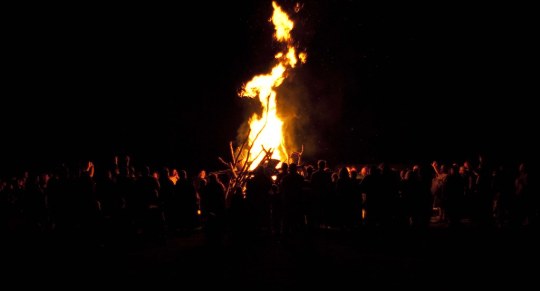
“The Keltiberians, and their neighbours to the north, [sacrifice] to a nameless god, every full moon, at night, before their doors, the whole family passing the night in dancing and festival”.
- Strabo. Geography, 3.4.16.
#Celts#Indoeuropeans#Celtiberians#Kelts#KEltiberians#Strabo#Geography#pagan#paganism#Europe#European paganism#indo-european#Tradition#R1b#Yamnaya#steppe#Forest#sacrifice#shamanism#Ataecina#Taranis#Iberia#Bell beaker culture#corded ware culture#WHG#EEF#ritual#sacred#Mircea Eliade#Carl Jung
33 notes
·
View notes
Text

“Among the most beautiful ... Of all peoples” Strabo 1st Century BC
—
“The Greeks and Romans considered the people of Ethiopia to be among the most beautiful and civilized of all peoples." Strabo 1st Century BC
14 notes
·
View notes
Text
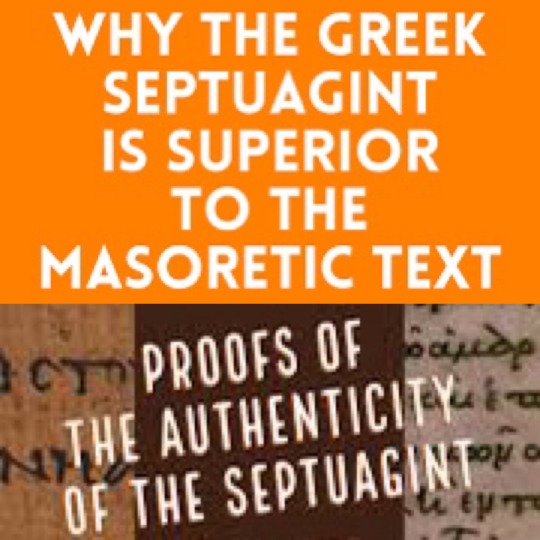
Was the Septuagint Destroyed When the Library of Alexandria Was Burnt Down in 48 BC?
By Author Eli Kittim 🎓
The Argument
Some people (typically Jewish apologists) claim that the Septuagint doesn’t exist because it was destroyed when the Library of Alexandria was burnt down in 48 BC.
This conclusion, however, is both textually misleading & historically erroneous.
First
The Alexandrian Library and its collection were not entirely destroyed. We have evidence that there was only partial damage and that many of its works survived. According to Wiki:
The Library, or part of its collection, was
accidentally burned by Julius Caesar during
his civil war in 48 BC, but it is unclear how
much was actually destroyed and it seems
to have either survived or been rebuilt
shortly thereafter; the geographer Strabo
mentions having visited the Mouseion in
around 20 BC and the prodigious scholarly
output of Didymus Chalcenterus in
Alexandria from this period indicates that
he had access to at least some of the
Library's resources.
Second
The Septuagint had already been written and disseminated among the diaspora since the 3rd century BC, and so many of its extant copies were not housed in the Library of Alexandria per se.
Third
Textual Criticism confirms that the New Testament authors used the Septuagint predominantly and quoted extensively from it. If the Septuagint didn’t exist, where did the New Testament authors copy from? And how do you explain the fact that the New Testament and the Septuagint often have identical wording in their agreements?
Fourth
The Dead Sea Scrolls also demonstrate that the Septuagint was far more accurate than the 10th-century-AD Masoretic text. See, for example, the textual controversy surrounding Deuteronomy 32:8. Both the Dead Sea Scrolls and the Septuagint have “sons of God.” The Masoretic text is demonstrably inaccurate because it has “sons of Israel,” a later redaction. Israel didn’t even exist at that time!
Fifth
Emanuel Tov, a leading authority on the Septuagint who has explained the various textual families (or text-types) of the Old Testament, never once mentioned that we lost the Septuagint, or that it was destroyed, or that it was no longer in circulation. On the contrary, he claims that it continued to be in use during the Christian period and that it is much more older than the 10th-century-AD Masoretic text, which the Jews call the “Hebrew Bible.”
Sixth
If the Septuagint was completely destroyed, as some have erroneously suggested, from where were the later revisionists and translators copying from? We have historical evidence that they were, in fact, copying from the Septuagint itself. Wiki writes:
Theodotion … was a Hellenistic Jewish
scholar, … who in c. 150 CE translated the
Hebrew Bible into Greek. … Whether he was
revising the Septuagint, or was working
from Hebrew manuscripts that represented
a parallel tradition that has not survived, is
debated.
So there’s evidence to suggest that the Theodotion version is a possible *revision* of the Septuagint. This demonstrates that the Septuagint existed in the second century AD! Otherwise, where was Theodotion copying from if the Septuagint didn’t exist?
Seventh
The great work of Origen, Hexapla, compiled sometime before 240 AD, is further proof that the Septuagint was still in use in the 3rd century AD! Wikipedia notes the following:
Hexapla … is the term for a critical edition
of the Hebrew Bible in six versions, four of
them translated into Greek, preserved only
in fragments. It was an immense and
complex word-for-word comparison of the
original Hebrew Scriptures with the Greek
Septuagint translation and with other Greek
translations.
Encyclopedia Britannica adds:
In his Hexapla (“Sixfold”), he [Origen]
presented in parallel vertical columns the
Hebrew text, the same in Greek letters, and
the versions of Aquila, Symmachus, the
Septuagint, and Theodotion, in that order.
Eighth
Besides Origen’s Hexapla, we also have extant copies of the Septuagint. According to wiki:
Relatively-complete manuscripts of the
Septuagint postdate the Hexaplar
recension, and include the fourth-century-
CE Codex Vaticanus and the fifth-century
Codex Alexandrinus. These are the oldest-
surviving nearly-complete manuscripts of
the Old Testament in any language; the
oldest extant complete Hebrew texts date
to about 600 years later, from the first half
of the 10th century.
Ninth
There’s also historical and literary evidence that the Greek Septuagint was in wide use during the Christian period and beyond. Wiki says:
Greek scriptures were in wide use during
the Second Temple period, because few
people could read Hebrew at that time. The
text of the Greek Old Testament is quoted
more often than the original Hebrew Bible
text in the Greek New Testament
(particularly the Pauline epistles) by the
Apostolic Fathers, and later by the Greek
Church Fathers.
Tenth
Today, Biblical scholarship has a *critical edition* of the Septuagint. If it was destroyed in 48 BC, where did the critical edition come from? The Göttingen Septuaginta (editio maior) presents *a fully critical text* and should silence the skeptics and critics who try to mislead the public. They deliberately mislead the public by trying to discredit the far more reliable and much older Septuagint in order to get people to accept the much later Hebrew Masoretic text from the Middle Ages!
#lxx#septuagint#Library of Alexandria#Strabo#textual criticism#Masoretic#EliKittim#NewTestamentGreek#dead sea scrolls#Deuteronomy32v8#EmanuelTov#SBL#Theodotion#the little book of revelation#HebrewScriptures#origen#Hexapla#aquila#julius caesar#IOSCS#Symmachus#ελικιτίμ#GreekOldTestament#critical edition#ΜετάφρασητωνΕβδομήκοντα#biblicalgreek#GöttingenSeptuaginta#τομικρόβιβλίοτηςαποκάλυψης#ΕλληνιστικήΚοινή#ΑγίαΓραφή
9 notes
·
View notes
Photo

L'histoire de la Cendrillon Égyptienne Démystifiée
L'histoire de Cendrillon est l'une des plus populaires au monde. En Occident, elle jouit d'une popularité continue depuis sa révision et sa publication par Charles Perrault en 1697, mais l'histoire de la jeune héroïne, injustement forcée à la servitude, qui accède à la royauté était déjà racontée des si��cles auparavant en Chine, sous la dynastie Tang (618-907), dans l'histoire de Yeh Shen. Dans cette histoire, la belle-mère et la demi-sœur maléfiques tuent les amis animaux de Yeh Shen, mais elles finissent par être détruites et la jeune fille obtient la main du roi.
Lire la suite...
3 notes
·
View notes
Text

PELOPS was the son of Tantalus, king of the Phrygians, who pined for Hippodamia, daughter of the king of Pisa. Seeking to have her as a wife, he was rejected by Oenomaus, father of that most elegant of virgins, who had set unfair conditions. This matter led to war: Oenomaus, betrayed by his captain Myrtilus, was conquered.
Therefore Pelops, having acquired Hippodamia as his wife, held the kingship of Pisa, in the 2617th year since the founding of the world and the 1346th before Christ was born. Known for his strength and wisdom, since he led many of his neighbors into the Peloponnese, he named the land “Peloponnese” after himself. Diodorus book 5, around the end.
He reigned for 59 years in Pisa, which is in Elis, next to Arcadia, whose residents founded the city in Italy of the same name. See Strabo, Geography book 7 and 8, also Raphael of Volaterra, book 34 [actually 30].
#pelops#prima pars#mythical figures#greek myth#rulers#diodorus of sicily#strabo#raphael of volaterra
1 note
·
View note
Text
Does anyone have the "bad work strabo" post saved? please
#filodox!#tagamemnon#strabo#ancient greece#I need it to give me hope and strength for a paper I am embarking upon
0 notes
Text
Indian-Ambassador-to-Rome-Augustus-Zarmanos-Khagan
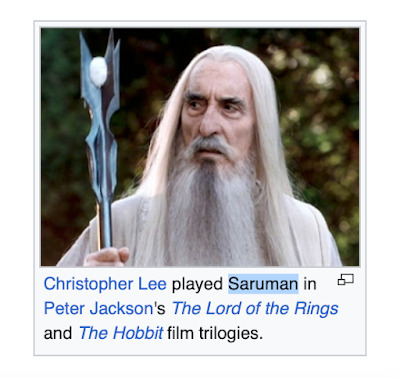
*
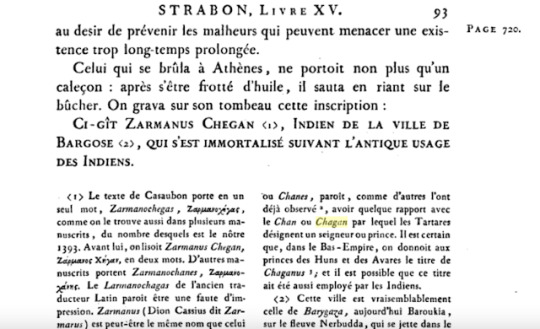
Strabon-Geography-Book-15
*
Strabon bundan 2000 yıl önce 'Coğrafya' adlı betiğinde şunu yazıyor: "Burada, Hintli atalarının geleneklerine uygun olarak kendini ölümsüzleştiren Bargosalı bir Hintli olan Zarmanochegas yatıyor." Peki, Hindistan Bargosa'dan İmparator Augustus'a gönderilen bu elçi kimin nesi?
ENGLISH:
Strabo writes this 2000 years ago in his book called 'Geography':
"Here lies Zarmanochegas, an Indian from Bargosa who immortalized himself in accordance with the traditions of his Indian ancestors."
So, who is this envoy sent from India Bargosa to Emperor Augustus?
*
*

Strabons Erdbeschreibung: in siebzehn Büchern, Volume 3
*
Adı Zarman-os/Sarman-os Khagan! Çoğu bilen adam, adamın namını zaten Türkçe Kağan ile açıklamış. Ama niyeyse adın kökeninde zorlanmışlar biraz. Cahil cesareti gösterip diyeyim: Neden SARMAN olmasın? Sarman Türkçemizde bol: Azman, iri; sarı (ak) anlamları var.
ENGLISH:
Most scholars have already explained the man's title/nick as Turkish Kagan.
But for some reason they had difficulty with the origin of his name ZARMANOS.
Let me show ignorant courage and propose this:
Why not Turkic SARMAN?
There are many "Sarman"s in our Turkish:
It means very big, great; yellow (white).
*
*
Eski Türkçe +man/men eki karşımıza çok çıkan bir ek. Renk adlarından ad yapar: >Alman, Akman, Karaman... * Bu elçinin adı niye bu şekilde açıklanmasın? Yani Ak/Sarı saçlı adam > SARMAN KAĞAN * 2000 yıl önce Hindistan'dan Roma'ya gelen elçi Türk. Daha ne yazayım bre?
*
ENGLISH:
The old Turkish +man/men suffix is a very common suffix.
Makes names from color names like:
>Al(RED)man, Ak(WHITE)man, Kara(BLACK)man...
*
Why shouldn't this ambassador's name be revealed in this way?
SARMAN-OS/ZARMAN-OS = white/blonde haired
> SARMAN KAGAN
*
Turkish ambassador who came to Rome from India 2000 years ago. A Turk who should visit Rome as Indian ambassador...
What else should I write?
*

Bargosa - India
*
Uzunbacak Adem
#SarmanKagan#ProtoTurk#ÖnTürk#PreGreek#ZarmanosKhagan#Strabo#Strabon#Geography#Bargosa#RomanEmpire#Türk
1 note
·
View note
Text
Timeline of Gnaeus Pompeius Strabo
103 - Strabo serves as Quaestor in Sardinia
102 - Strabo seeks to prosecute Titus Albucius the pro Praetor he served under in Sardinia
94 - Strabo serves as Praetor
93 - Strabo made Governor of Sicily
90 - probably spring - Strabo defeated at Mount Falernus by Ventidus & Scato
90 - Strabo besieged in Firmum
90 - Strabo breaks out and attacks Lafrenius’ army and L. Is slain and his troops flee to Asculum
90 - Siege of Asculum begins
90 - winter - Strabo returns to Rome to stand for consul
89 - Strabo elected consul
89 - Strabo intercepts an Italian army heading across the Apennines from the Adriatic to Etruria trying to spread the revolt
89 - Fall - Siege of Asculum breaks Strabo orders the prominent men of the city beaten and beheaded, slaves sold and all others to leave the city
89 - Strabo proposes Latin Rights to Cisalpine Gaul
89 - December - Strabo given triumph
88 - Strabo fails reelection to consulship
88 - Outbreak of Sullan Civil War and Rome is seized
88 - Quintus Pompeius Rufus sent to take command of Strabo’s army and murdered by some of his men
87 - Strabo and his army come to Rome but their allegiances are not known
87 - Cinna recruits Lucius Terentius the tent mate of Pompeius Magnus to lead an assassination and coup in Strabo’s camp
87 - assassination of Strabo foiled by Pompeius Magnus
87 - 800 of Strabo's men do leave but most are convinced to remain by Pompeius Magnus
87 - Cinna’s actions force Strabo to choose the side of Octavius and the Senate
87 - Strabo and Octavius expel Marius and Cinna's forces from the city of Rome
87 - Strabo is killed by lightning strike and his body is drug from its bier and disrespected
---------------------------------------------------
This is going to be edited with links to posts about other figures referenced as I make them. I'm using this for my research but figured I would share for those interested in the Pompeius gens. I will be making timelines for other family members as I research and adding any new information I find on Strabo to this one
#ancient rome#roman history#roman empire#how often do you think about the roman empire#ancient history#pompeius magnus#pompey#sextus pompey#Pompeius strabo#Strabo#strabo the butcher#Pompey strabo#gnaeus pompeius magnus#Gnaeus Pompeius Strabo#roman republic#the social war#latin rights#cinna#sulla#Asculum#Pompeius rufus#Rufus#Cisalpine Gaul#Sardinia#sicily#timelines#house of Pompeius#Pompeius gens#Roman gens#the ancient and most badass gens of Pompeius
4 notes
·
View notes
Text
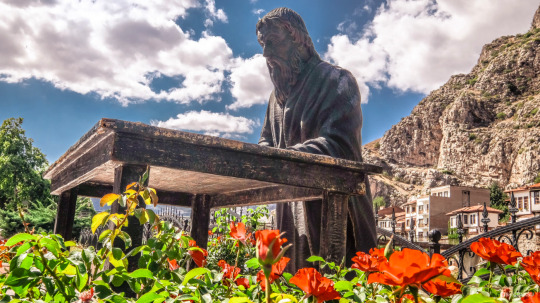
Strabo the Geographer (photo by Spaksu)
The science of Geography, which I now propose to investigate, is, I think, quite as much as any other science, a concern of the philosopher; and the correctness of my view is clear for many reasons. In the first place, those who in earliest times ventured to treat the subject were, in their way, philosophers — Homer, Anaximander of Miletus, and Anaximander's fellow-citizen Hecataeus — just as Eratosthenes has already said; philosophers, too, were Democritus, Eudoxus, Dicaearchus, Ephorus, with several others of their times; and further, their successors — Eratosthenes, Polybius, and Poseidonius — were philosophers. In the second place, wide learning, which alone makes it possible to undertake a work on geography, is possessed solely by the man who has investigated things both human and divine — knowledge of which, they say, constitutes philosophy. And so, too, the utility of geography — and its utility is manifold, not only as regards the activities of statesmen and commanders but also as regards knowledge both of the heavens and of things on land and sea, animals, plants, fruits, and everything else to be seen in various regions — the utility of geography, I say, presupposes in the geographer the same philosopher, the man who busies himself with the investigation of the art of life, that is, of happiness.
—Strabo, Geography: Book I
0 notes
Text
dards - war-like north westernmost “indo” aryans & asvas
- Strabo and Pliny mentioned war-like people Dardae.
- The term "Dardic" is only a geographic convention used to denote the northwesternmost group of Indo-Aryan languages (spoken in northern Pakistan, northwestern India and parts of northeastern Afghanistan)
- Usage of the term is curiously parallel to the Sanskrit usage, where it connoted nonspecific ferocious outsiders living in the mountains beyond the borders of the region.
- Dardic languages contain absolutely no features which cannot be derived from old [Indo-Aryan language]. They have simply retained a number of striking archasisms, which had already disappeared in most Prakrit dialects... There is not a single common feature distinguishing Dardic, as a whole, from the rest of the [Indo-Aryan] languages... Dardic is simply a convenient term to denote a bundle of aberrant [Indo-Aryan] hill-languages which, in their relative isolation, accented in many cases by the invasion of Pathan tribes, have been in varying degrees sheltered against the expand influence of [Indo-Aryan] Midland (Madhyadesha) innovations, being left free to develop on their own
- Due to their geographic isolation, many Dardic languages have preserved archaisms and other features of Old Indo-Aryan. These features include three sibilants, several types of clusters of consonants, and archaic or antiquated vocabulary lost in other modern Indo-Aryan languages.
- Kalasha and Khowar are the most archaic of all modern Indo-Aryan languages, retaining a great part of Sanskrit case inflexion, and retaining many words in a nearly Sanskritic form.[29][30] For example at’hi "bone" in Kalasha is nearly identical to asthi in Sanskrit[31] and ašrú "tear" in Khowar is identical to the Sanskrit word

- The Sanskrit term aśva, Avestan aspa, and Prakrit assa means horse. The name Aśvaka/Aśvakan or Assaka is derived from the Sanskrit Aśva or Prakrit Assa and it denotes someone connected with the horses, hence a horseman, or a cavalryman or horse breeder. The Aśvakas were especially engaged in the occupation of breeding, raising and training war horses, as also in providing expert cavalry services.[citation needed]
- The name of the Aśvakan or Assakan has been preserved in that of the modern Afghān.
- According to philologist J.W. McCrindle, the name Aśvaka is also "distinctly preserved" in the name of the Esapzai (or Yusufzai) tribe of Pashtuns. McCrindle noted: "The name of the Aśvaka indicates that their country was renowned in primitive times, as it is at the present day, for its superior breed of horses.
- The fact that the Greeks translated their name into "Hippasioi" (from ἵππος, a horse) shows that they must have been aware of its etymological signification."
- Ancient Greek historians who documented the exploits of Alexander the Great refer to the Aspasioi and Assakenoi (Ἀσσακηνοί) tribes among his opponents. The Assakenoi fielded 2,000 cavalry, 30 elephants and 30,000 infantry against Alexander during his campaign in India, which began in 327 BCE, but they eventually had to surrender after losses at places such as Beira, Massaga and Ora
- Diodorus recorded the strength of the Aśvaka opposition, noting that the women took up arms along with the men, preferring "a glorious death to a life of dishonour".[21]Queen Cleophis was the main leader of Ashvaka during their war against Alexander.
- The Asvayanas have been attested to be good cattle breeders and agriculturists by classical writers. Arrian said that, during the time of Alexander, there were a large number of bullocks - 230,000 - of a size and shape superior to what the Macedonians had known, which Alexander captured from them and decided to send to Macedonia for agriculture
#Karakoram#kashmir#hindukush#himalayas#everest#india#pakistan#jammu#afghanistan#mountains#history#dard#dardistan#indoeuropean#hindi#sanskrit#aryan invasian#south asia#greek#strabo#pliny#ancient history#dardic#north india#vadakkan#vadakku#aryan#indo aryan#hind#hindu
0 notes
Text
AGAINST ALL ODDS | CORIOLANUS SNOW X PLINTH!READER





As the last heir to the Plinth family, you're caught up in an arranged marriage with no one other than Coriolanus Snow. In a civilization that relies on power and survival, Strabo Plinth, for once, has obtained his ultimate desire - something that money can't buy - to secure his position within the Capital's commonwealth and establish the Plinth family as an influential figure in Panem.
You've always dreamed of a life beyond societal expectations and political alliances, where you can make your own choices in life and love. On the other hand, Coriolanus Snow is a cold and calculated individual known for his ruthless nature and thirst for power.
Tasked with redeeming the tarnished Plinth name after your brother Sejanus's death - you'll stop at nothing to ensure that you get the life you've yearned for and do not meet the same fate as your brother.

TABLE OF CONTENTS
chapter one
chapter two
chapter three
chapter four
chapter five
chapter six
all chapters will also be posted on AO3
#young coriolanus snow#coriolanus snow smut#coriolanus x reader#coriolanus snow x reader#coriolanus snow#coriolanus x sejanus#sejanus plinth#strabo plinth#lucy gray baird#arranged marriage#the ballad of songbirds and snakes#tbosas smut#tbosas fic#tbosas#reader insert#the hunger games#catching fire#mockingjay#⟢CREATION OF TIME#chapter index#cross posted on ao3#coriolanus snow x plinth!reader#ao3
1K notes
·
View notes
Text








ACADEMY! SEJANUS PLINTH.
#sejanus plinth#josh andres rivera#thg#academy#the capitol#the hunger games#tbosas#the ballad of songbirds and snakes#i love him so much#gifs#ma plinth#strabo plinth
388 notes
·
View notes
Text










Sejanus Plinth + being rejected/misunderstood by the most important men in his life
#sejanus plinth#the ballad of songbirds and snakes#ballad of songbirds and snakes#tbosas#snowjanus#sejarcus#coriolanus snow#marcus tbosas#strabo plinth#*#idk what this is honestly but I hope it makes sense
89 notes
·
View notes